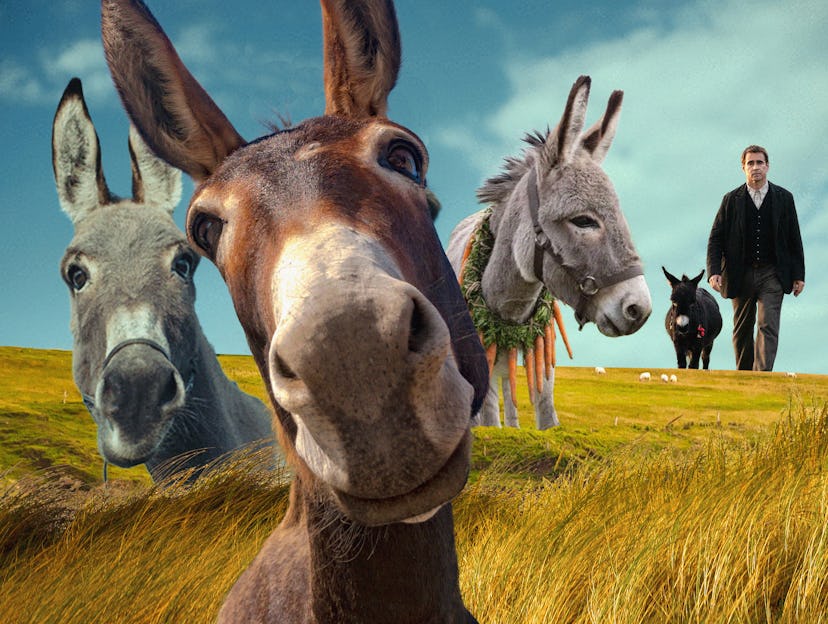
In the film EO, the titular donkey is repeatedly placed next to horses and, in the eyes of his* keepers, found wanting. The gleaming white stallions flash their well-kept manes and trot around their enclosures while EO watches from a distance, saddled to a cart: They are the showpieces, and he but a beast of burden.
Historically, people love them some horses. They love to watch them run across wide open landscapes and also on little tracks. They love to ride on them and pretend that this is a mutually beneficial act. They love to admire their untamable nature and then tame them. And the horse’s humble, squat cousin, the donkey? He’s been nothing but the butt of the joke, quite literally: Just an ass. But in EO, the audience knows the donkey is the star. All melancholic eyes, overlong ears, and inelegant gait, the unlikely hero eee-aww’s his way through a European odyssey unlike any other. He meets a wide range of people along the way, most of whom suck, but EO’s moral compass stays pointed due North — even as he repeatedly finds himself lost on the map. (Someone get this guy a GPS!) Whether working as a therapy animal or a circus performer, EO longs only for companionship and peace.
And EO isn’t the only donkey who clomped his way into our hearts this year. There was also The Banshees of Inisherin’s Jenny, the miniature donkey who serves as a kind of emotional support animal to Pádraic (Colin Farrell) as he grieves his friend divorce. A born actor, Jenny easily keeps pace with her costars, the ultra-eyebrowed Farrell and finger-deficient Brendan Gleeson. With one look, she says what she cannot with her silly little honks; it’s easy to see why Farrell’s character insists on letting her hang out with him inside, her adorable little pot belly resting by the fire. A donkey also briefly appears in the overwrought eat-the-rich send-up Triangle of Sadness, and in Pinocchio, a guy turns into a donkey! (The dream.) The donkey, it seems, has finally arrived.
It couldn’t have come at a better time. If people once sought to emulate the haughty, vigorous horse, setting out on noble steeds to conquer the world, the 21st century has pulled the wool (horsehair?) off their eyes. Technical innovation wreaked havoc on the planet; the internet has proved most useful for making everyone argue extra loudly; not even a pandemic could rouse the world to unite in common cause; no one’s closer to figuring out why we hiccup. Humanity, as EO learns firsthand, has galloped right off a cliff.
The path forward is not on horseback, but beside the awkward, braying donkey. Undersized and cute-in-an-ugly-way, these creatures aren’t built for conquering, nor are they interested in it; they just want to eat carrots and chill. Gaze into those saucer-like eyes and abandon your desire for speed or expansion or “progress.” Find a nice field to stand in with your comrades and, if you are a miniature donkey like Jenny, avoid any severed phalanges that fly your way. As Jenny’s faithful companion Pádraic argues, niceness is what lasts, not greatness: “My mammy, she was nice. I remember her. And my daddy, he was nice. I remember him. And my sister, she's nice. I'll remember her. Forever I'll remember her.” But what of Mozart, Gleeson’s Colm asks — one of the most famous people to be born in the 17th century? Everyone remembers him, and not because he was nice. “Well, I don't,” Pádraic replies, “so there goes that theory.”
*EO is played by both male and female donkeys. A gender-fluid king.